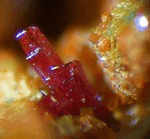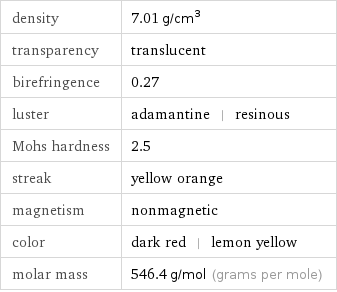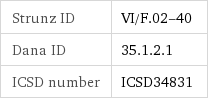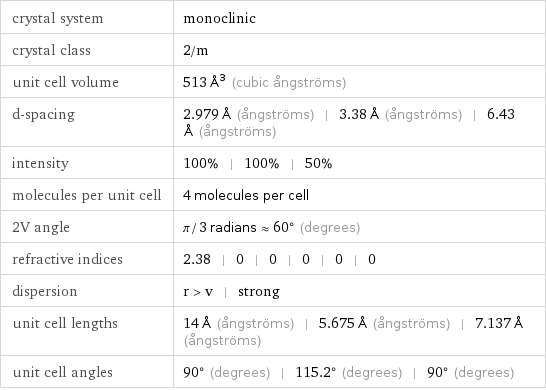Input interpretation

phoenicochroite (mineral)
Image

Image
General properties

alternate names | chrominium | melanochroite | phenicochroite | phoenicite | scheibeite | subsesquichromate of lead formula | Pb_2(CrO_4)O discovery year | 1839
Basic properties

density | 7.01 g/cm^3 transparency | translucent birefringence | 0.27 luster | adamantine | resinous Mohs hardness | 2.5 streak | yellow orange magnetism | nonmagnetic color | dark red | lemon yellow molar mass | 546.4 g/mol (grams per mole)
Units

Mineral identifiers

Strunz ID | VI/F.02-40 Dana ID | 35.1.2.1 ICSD number | ICSD34831
Crystallographic properties

crystal system | monoclinic crystal class | 2/m unit cell volume | 513 Å^3 (cubic ångströms) d-spacing | 2.979 Å (ångströms) | 3.38 Å (ångströms) | 6.43 Å (ångströms) intensity | 100% | 100% | 50% molecules per unit cell | 4 molecules per cell 2V angle | π/3 radians≈60° (degrees) refractive indices | 2.38 | 0 | 0 | 0 | 0 | 0 dispersion | r > v | strong unit cell lengths | 14 Å (ångströms) | 5.675 Å (ångströms) | 7.137 Å (ångströms) unit cell angles | 90° (degrees) | 115.2° (degrees) | 90° (degrees)
Wikipedia summary

Phoenicochroite, also known as melanochroite, is a lead chromate mineral with formula Pb_2OCrO_4. It forms striking orange red crystals. It was first discovered in 1839 in Beryozovskoye deposit, Urals, Russia. It is named from the Greek word φοίυικος for "deep red" and χρόα for "color, " in allusion to its color.